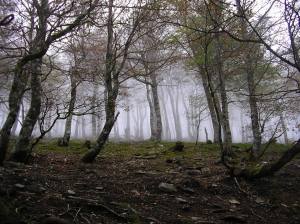
Last week I was talking about that feeling of being in a fog. Where do I start? What’s my story? How will I know? This Saturday morning when I awoke in my part of town, the sky was blue and clear. Moving west toward Pointe Claire, I hit a dense bank of fog. Pretty appropriate for Blog number two, I figure.
Let me give you a few riddles. Writer riddles. Like all riddles, they are a little irritating but, in the end, useful. What’s the story you should write? The one whose end you want to know. Why do we write the stories we write? To find out how they’ll end. I told you they were a little irritating! But true: they take into account the basic human need, beyond food and shelter, to find out how the story ends. That’s why I talked about writing what you want to know, as opposed to what you do know, the last time. The story that’s important is one that holds elements of mystery and unknown things that we want to get to. That’s how I work, in any case.
In my upcoming novel with Cormorant due in the spring of 2014, I have two girls growing toward womanhood at the very beginning of the 1930s in Chicago (the date is important because the father of one of them is a bootlegger, a gangster). They are more than best friends; they are in a state of fusion. Though they know they’ll have to get married sooner or later, they would prefer to marry each other, though that isn’t going to happen. The question for me is how this wonderful friendship is going to end. How will life separate them? I wanted to find out…
One hint: a man doesn’t come between them. For the rest, you’ll have to wait till next spring. But there was only one way to discover how it all turns out, and that was to write the book. And the search – the writing – has to really matter. Pardon my exaggeration, but it has to be vitally important to the writer, without which he or she might well perish. You need that kind of devotion to make something out of nothing, day after day, in obscurity. Freud said that the ability to defer pleasure is among the markers of maturity. In that case, writers can all call themselves mature, despite certain evidence to the contrary, because they can wait years before they experience the pleasure of seeing their stories in print. It’s better to have some other sources of pleasure along the way!
So find a story with some missing elements, some shadows, some things you need to know. When you think about it, all the stories that surround us are full of missing pieces. Even the stories we’re most sure of. If you start out working on a story that you think you know all about, all the way to the end, you’ll soon discovery the contrary, I’m willing to bet. Writing has a way of doing that. Pretty soon the story you set out to tell will change. Which is why you wanted to write it in the first place.

